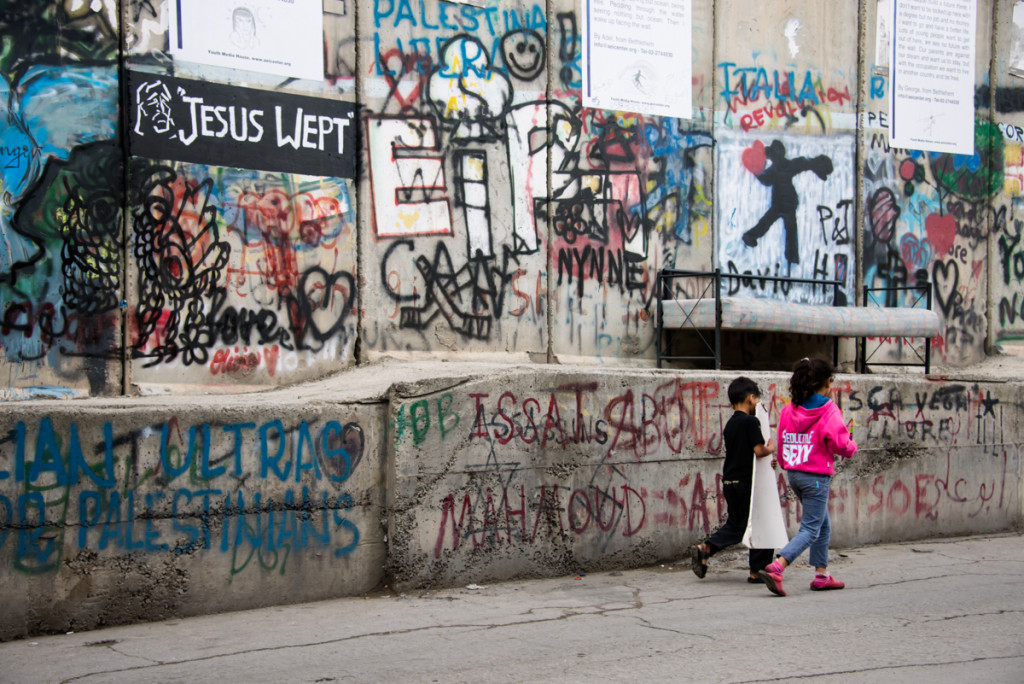Ashraf And The Violence In The Bible
Ashraf and I had been friends during his bachelor days. He laughed easily back then, with a joyful sound that overwhelmed the whole table while we ate. That laugh sadly became more rare and more strained as US politics conflicted more and more with hopes of freedom for Gaza. This was during the end of the 1990s, a few years before 9/11, but for Palestine life was already terrible. I was very slow in coming to understand this; this is the story of how I began to see Palestine differently.
How can such a thin man shake the windows with his laugh like this? I wondered. He was a very good-looking young man with a smile that seemed wider than his face. My young daughters all adored him
I knew he was from Palestine, but that didn’t mean much to me. My politics and religious sentiments supported Israel, but Ashraf was so much fun that I was willing to overlook his background. We could be friends as far as I was concerned. After all, I was an open-minded kind of guy.
We were each busy, and it was not unusual for us to go several months without seeing each other. Then one day he called and invited us to dinner at his apartment.
What a shock it was when Ashraf opened the door with a mischievous grin and introduced us to his new wife! He had married a protestant Christian girl from Pennsylvania.
She was memorizing her prayers in Arabic. With a new marriage she had adopted a new religion. Marrying into a Palestinian family also brought with it new politics and loyalties, as I would find out later in the evening.
Real theology and vital Bible study should not happen apart from loving real live people.
Some women from the mosque had been teaching her how to cook Palestinian-style food. The apartment smelled wonderful! We sat down to a feast, during which we kept pestering the new couple for details about how they’d met and fallen in love.
Then, as we were all slowing down and pushing back our chairs, Ashraf picked up a big book from a nearby chair. It was a Bible. He opened it to a bookmarked spot and ran his finger down the column. Then he looked at me for a moment before he began to read.
“Now go, attack the Amalekites and totally destroy all that belongs to them. Do not spare them; put to death men and women, children and infants, cattle and sheep, camels and donkeys” (1 Samuel 15:3).
Then Ashraf held the Bible out with his finger under the passage to show me that he hadn’t made it up. I looked at it. I was already familiar with it.
I grew up without a television, so the Old Testament had been my main source of blood and violence, which seem to be almost indispensable nutrients for growing young boys. I loved the stories of the conquest of Canaan with their gory details of the slaughter of kings and the destruction of cities. But I had a feeling that Ashraf wasn’t loving this verse.
“Those are Palestinians. They are my ancestors. Already Israel was trying to kill us. If they had succeeded, I never would have been born.”
Ashraf watched me. What could I say? I thought about explaining that God is always right, and if he says “Kill them all” then that would have been better. I thought about hinting that killing them all might have averted the current struggle between Israel and Palestine.
What stopped me from saying these things is that, looking at my friend, I couldn’t imagine them to be true. In the face of friendship, those pious-sounding explanations were repulsive. They failed to account for my simple love for Ashraf, and much more they failed to account for the love of Christ. For the first time I wondered if I had missed something about those old stories. I didn’t know what, but maybe I had read them wrong. I just knew that I did not believe that God was disappointed that Ashraf had been born. God did not hate Ashraf and neither did I.
And so, without knowing what I was going to say, I heard myself say the only thing I knew for sure was true, “I’m glad they didn’t do it.”
At that time I was attending a church that was doctrinally heavy, theologically rigorous, and extremely intellectual. I knew that I could not defend my response to Ashraf by means of our formal theology. In what I had truthfully told him, I had placed myself in an adversarial role to the Westminster Confession.
Staring into my friend’s eyes I had caught a glimpse of a truth that I’ve encountered many times since then: Real theology and vital Bible study should not happen apart from loving real live people. The answers that satisfy us in the classroom when surrounded by people who all agree need to be tested and revised when brought into contact with life. We need those who don’t share our preconceptions at least as much as we need those who do.
May our intellects be willing to yield to love when the two appear at odds. Love will, in the end, provide a better place for the intellect to be of service.
The father of four daughters, Doug Baker is the author of Covenant and Community (Wipf & Stock, 2008) and currently looking for a publisher for a novel. His passion at the moment is to increase the connections between the Christian and the Muslim communities in Bloomington, IN.




